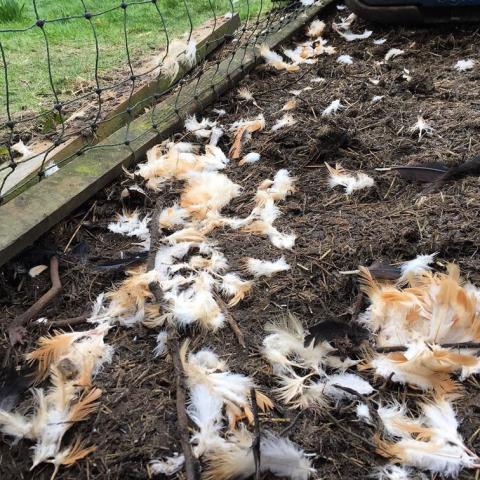Summary
Surplus killing evolved as a response to unpredictable food resources – get what you can when you can. Arguably, not taking full advantage of such a situation is a waste of an opportunity. It can only be seen as a waste of energy for the predator if they are somehow prevented from recovering their prey.
The Details

Foxes are well known to kill more than they can eat at the time. Surely killing to excess represents a waste of energy and resources for a wild animal?
If prey is easily available a predator doesn’t need to be hungry to exploit it. This scenario, where a predator kills without the motivation of hunger, or kills more than is necessary to satiate its hunger, is referred to as “surplus killing”. The behaviour isn’t unique to foxes; wolves, leopards, caracals, coyotes, hyenas, bears, shrews, mink, polecats, weasels and domestic cats are among some of the many species in which the behaviour is known. The problem in the case of foxes, however, is that they often target species that are important to us, such as livestock or pets, and this makes the behaviour more difficult for many to accept than a cat killing songbirds or mice.
The act of killing more than you can eat at any given time appears to represent a significant waste, both in terms of the food resource and the predator's energy. A dictionary definition of the verb “waste” goes something along the lines of “to use, consume or expend [a resource] thoughtlessly, carelessly, or to no avail”. Equally, however, waste could be interpreted to mean to “fail to take advantage of” a resource or situation. Immediately we are struck by the idea that, just as a predator may be considered to have ‘wasted’ a resource by killing more than it requires at the time, it could similarly be considered to have ‘wasted’ the opportunity to obtain more food when the situation arose.
This is not far-removed from us going to the supermarket and buying a weekly shop. You pick up a joint of meat and put it in the trolley even though you’re probably not planning to eat it for a few days, perhaps for Sunday lunch, and you’re probably not even hungry while traipsing up and down the aisles. You’ll probably now stick the joint in the freezer until Sunday morning. Most of us operate this way because it’s actually more efficient to do one weekly shop than it would be to go to the supermarket or corner shop to buy only what you needed for the day ahead.
Similarly, surplus killing can only really be considered a waste of energy for a predator if they expend more energy killing prey in a single ‘hit’ than they would killing the same number individuals over a longer period of time. Ergo, if a fox expends X calories killing 20 chickens in a coop, this act only represents a waste of energy if the same fox were to expend fewer than X calories killing one chicken per night over, say, 20 nights.
Hunting over the 20 nights a lot can happen – the fox has to break in, make a kill and get out without being discovered or the defences being fortified the following day. Indeed, the main exception is if the fox is in some way prevented from eating its kills. If the fox is discovered before it can move all the chickens, or it’s cache is raided by another animal, then the energy expended by the fox to kill the chickens provides no benefit to the fox’s direct fitness and the surplus killing event could then be considered a waste of the fox’s energy.

The idea that surplus killing represents a waste of resources seems less likely when we consider that predators often bury (cache) un-eaten food. Wildcats, for example, have been observed to put the remains of their meals under logs; stoats (Mustela erminea) and mink (Mustela vision) larder cache, while pumas (Felis concolor) may scrape branches or leaves over a carcass, presumably in a bid to conceal it. Polecats (Mustela putorius) are known to store frogs in their dens after biting the heads to immobilize them.
Still, caching is not infallible; have you ever cleaned out the kitchen cupboards or fridge and found food that has exceeded its “Best Before” date? Some cached food will invariably never be recovered. Nonetheless, the evolution of caching behaviour by predators goes some way to reducing the ‘waste’ otherwise generated by killing to surfeit.